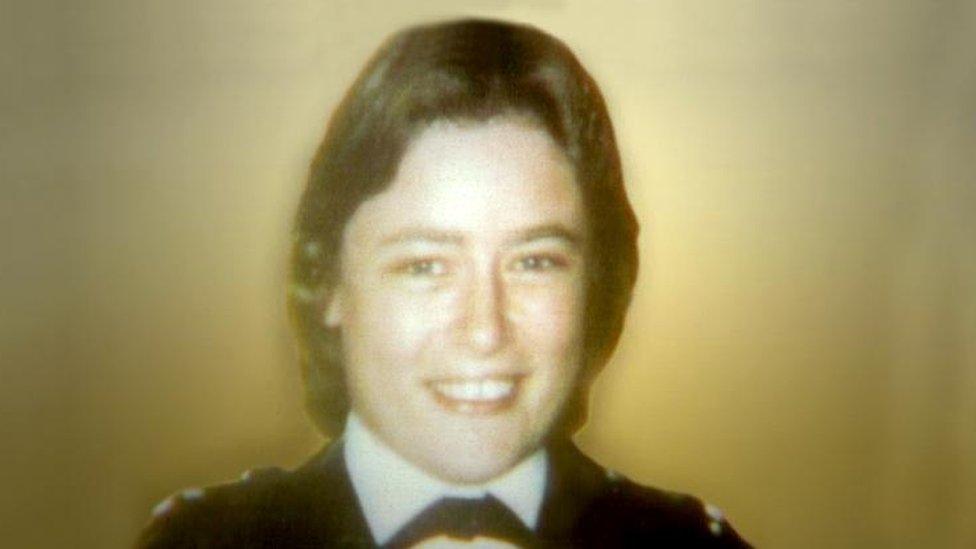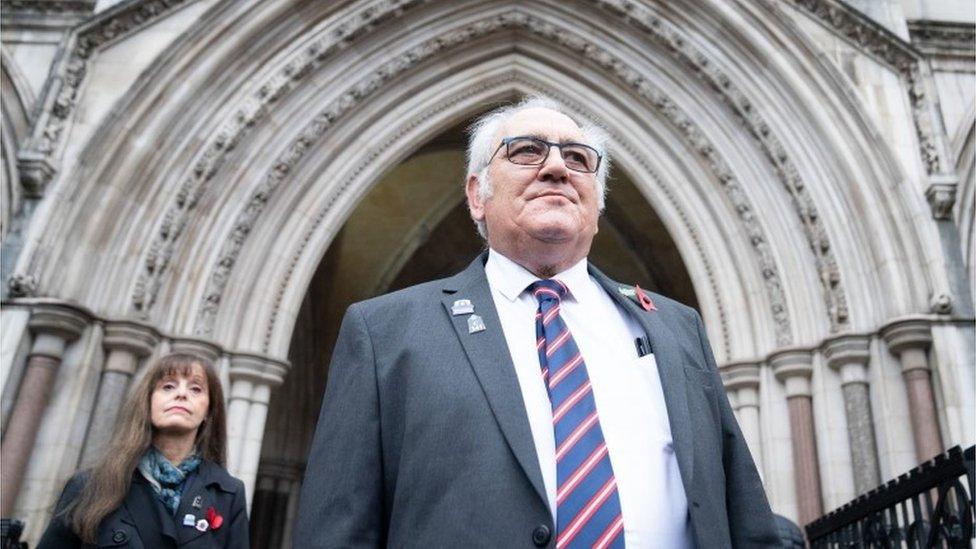Yvonne Fletcher murder: Civil case 'keeping my promise' says colleague
- Published

Yvonne Fletcher was killed in 1984 outside the Libyan Embassy
A former police officer says he is keeping his promise to his friend and colleague PC Yvonne Fletcher, as a civil trial opens into her murder, which happened nearly 40 years ago.
PC Fletcher, 25, was killed by shots fired from the Libyan People's Bureau in London on April 17 1984.
As she lay dying, fellow officer John Murray promised her he would find those responsible and bring them to justice.
He has brought a civil case against Salah Ibrahim Mabrouk, who is in Libya.
The allegation is not that Mr Mabrouk fired the actual shots but that he was jointly liable for the events that took place.
Mr Murray told the BBC that he was determined to stand by his commitment to PC Fletcher. "I am keeping that promise. My job is nearly over. My job was to get someone in a court of law and I think I've done it."
Adding it was a "wonderful feeling" to see the case begin. "It's taken a long, long time to get here".
The murder was described in court as "state sponsored act of terrorism" for which "no one has ever been brought to justice".
'Lack of accountability'
"This is a very strange trial," Philippa Kaufmann QC, acting for Mr Murray, acknowledged, since Mr Mabrouk is not defending the case and also because the events are more than 37 years old.
She said there had been a "total lack of accountability for the murder".
The shots, the court was told, came from two Sterling sub-machine guns within the embassy and were aimed at protesters against the then-Libyan leader Colonel Gaddafi.
It heard that PC Fletcher collapsed into fellow officers when she was shot.
Mr Murray carried her to an ambulance and accompanied her to hospital where she died.
Later Mr Murray was asked to identify her body. In written submissions, the court heard he has since suffered post-traumatic stress disorder (PTSD).

John Murray promised PC Yvonne Fletcher that he would bring those responsible for her death to justice
"It was tough," he said of the opening day of the court hearing where video of the immediate aftermath was shown. "There's some things I couldn't look at and some things I couldn't really listen to."
Mr Mabrouk had been detained by police earlier on the morning of the shooting. He had been involved in a confrontation as barriers were being put up in advance of the protest.
"We have guns here today, there is going to be fighting," he was alleged to have told one of the men putting up the barriers, the court heard.
In written submissions, the court was told it was "inconceivable" that Mr Mabrouk was not at the heart of decision-making over the use of violence and that the "orchestration" of the shooting was "entirely consistent" with his role at the building.
The court was shown pictures taken by a police photographer inside the building showing pistols and ammunition.
Mr Mabrouk was deported after the shooting, but later returned to the UK.
Police arrested him in 2015 in connection with the murder. But the case was dropped in 2017 when the Crown Prosecution Service said that evidence could not be admitted for reasons of national security.
That has led to today's civil case. Mr Murray, a close friend as well as colleague of PC Fletcher, is only seeking £1 in vindicatory damages.
Mr Mabrouk has since been excluded from the UK and is not represented in court.
In a statement to Mr Murray's lawyers he said: "I cannot apologise for something I didn't do… I had no role in the sad killing of WPC Fletcher."
Mr Murray said it was "disappointing" that Mr Mabrouk wasn't present. "He's been given every opportunity to be here... I would really like to look him in the eye."
The case continues and is expected to last three days.